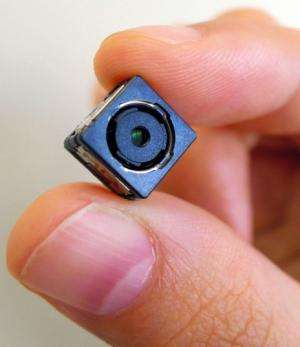December 28, 2012 report
Toshiba smartphone camera sensor has eye on future

(Phys.org)—Toshiba may be targeting the end of 2013 for the launch of a new camera sensor for smartphones and tablets, where the picture taker can choose a specific area of focus in the photo after having taken the photo. Photography enthusiasts as well as all creative picture-takers will be able to manage how they want the photograph to tell the story, allowing for managing the focus after the fact. This resonates heavily with the Lytro light field camera, which was introduced as a way to allow photographers to shoot the image first and focus on the subject later, thinking about focus points during the editing process.
The Toshiba sensor is a departure from Lytro, however in size; Lytro is marketing cameras about the size of a palm. Toshiba's package is smaller than Lytro's longer body. The Toshiba measurements indicate it is suitable for a smartphone.
When the sensor launches, users will also be able to work with videos shot on the smartphone or other device. The cube-shaped module is about 1 centimeter per side. About 500,000 small lenses go to work, each about 0.03mm in diameter, each grabbing a slightly different image. Then all are combined into one, with the use of Toshiba software.
The Toshiba mechanism works similar to the way the compound eye structure functions in insects. Reports say Toshiba 's next step is to look for smartphone and tablet manufacturers who will want to adopt its sensor technology. The Asahi Shimbun carried the report earlier this week. Toshiba is said to be planning to commercialize the module by the end of fiscal 2013.
The Lytro, a creation of Lytro company founder Ren Ng, is the result of Ng's work on the camera when he was at Stanford, and his product drew attention as a shoot now focus later camera representing "light field technology." The Lytro technology spread awareness of how the focal point of a digital image can be changed after the picture is taken, for example, where it is possible to shift the focus from a subject in the foreground to a subject in the background.
More information: ajw.asahi.com/article/economy/ … iness/AJ201212270054
© 2012 Phys.org





















